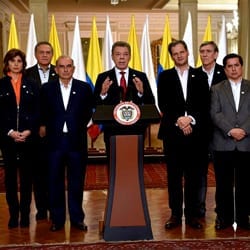After Sunday’s vote, it is unclear what the next steps will be in resolving Colombia’s decades-long conflict with the Revolutionary Armed Forces of Colombia (FARC) guerrilla group. The final vote on the peace agreement negotiated by President Juan Manuel Santos showed a clearly divided country: 50.2 percent voted “No” and 49.8 percent voted “Yes” (with a 63 percent abstention, the highest in decades for any election).
The immediate impact of the decision is that the agreement cannot move forth as is. Instead, the ceasefire currently in place could end, the FARC will not have to give up their weapons and the rebel group might continue its illegal activities in order to finance its operations. The main sticking points for the “No” camp were the FARC’s desire to not be treated as criminals under the agreement, since they see themselves as an armed political/philosophical group; the fact that they would have had political representation through as many as 10 seats in Congress (five in the Senate and five in the House) for two terms (8 years), after which they would have to be voted in by the people; and the issue of money, as some voters feel that the FARC should return all illegally obtained funds.
President Juan Manuel Santos will not resign, but he is politically weakened and will be a lame duck for the rest of his term (which ends in August 2018). He does, however, continue to have a constitutional mandate for finding peace for Colombians. In last night’s address to the country after the final results came in, he indicated the bilateral ceasefire would continue. He also called on all political representatives from the “No” camp to meet Monday to discuss the issues, and he has asked the lead negotiator for the government’s peace commission (who presented his resignation for consideration by the president, which many feel will not be accepted) and the high commissioner for peace to travel to Havana, Cuba, to maintain dialogue with the FARC representatives and keep them abreast of the result of Monday’s meeting. It is uncertain if the summit in Colombia will be as successful as previously anticipated, since the leading party against the agreement, the Centro Democrático party led by former President Alvaro Uribe, has indicated that members will not attend, stating that the party should meet separately first in order to come to the table united on the issues they want to discuss.
Santos and the FARC have both expressed interest in continuing the peace negotiations in order to reach an agreement that will be approved by the majority.
There have been talks of a possible constituent or constitutional assembly as the best process for bringing about the agreement — something the FARC had wanted originally but the government opposed. The constituent assembly could then reach a consensus that would represent the voices of different political and social sectors (such as Christian churches, which seem to have had some influence over the “No” vote). However, the mandate for the assembly must be very limited in scope and have a set timeline, since some fear that members could end up discussing other matters outside of the peace agreement, prolonging a decision. Uribe, the leader of the “No” movement, has already expressed interest in discussing issues concerning the economy and taxation, as well as concerns related to “family values” (a reference to a contentious decision by the Constitutional Court in April allowing gay marriage in Colombia).
Santos’ political weakness could make it harder for him to implement needed policy reforms, in particular a fiscal reform that is long overdue. Colombia has a significant fiscal deficit (forecast by Standard & Poor’s at 6 percent of GDP in 2016) as a result of the collapse in the price of its main export — oil. The fiscal reform will probably still be approved, since Santos has a working majority in Congress, but its quality and depth might suffer. This could lead to a debt downgrade by the rating agencies, which could make growth recovery harder. The Central Bank and the Finance Ministry have a good reputation, but it might not be enough to avoid investors’ worries if the political obstacles derail the needed reforms.
There are also questions as to how the constituent assembly would be organized and if the FARC are eligible to participate. The Constitution establishes that representatives to the assembly must be elected by the people, and the people have clearly demonstrated their opposition to the FARC. Therefore, the FARC might face an uphill battle in an election, especially against representatives of the “No” camp. However, reaching a consensus without the participation of the FARC might not be acceptable to FARC members.
At this point, what is clear is there is still a will to find a solution by both the government and FARC. The conversation now turns to “How?” There is much uncertainty about the best way to resolve this question.
Lisa Guáqueta is the program manager of the Baker Institute Mexico Center. Francisco J. Monaldi is a fellow in Latin American energy policy at the Baker Institute.
